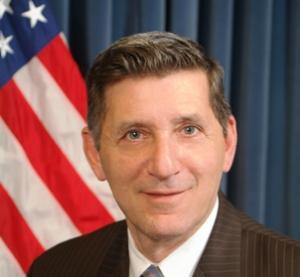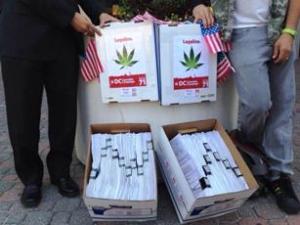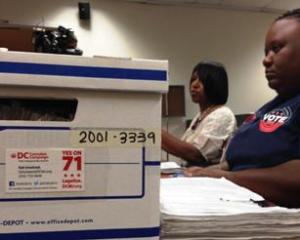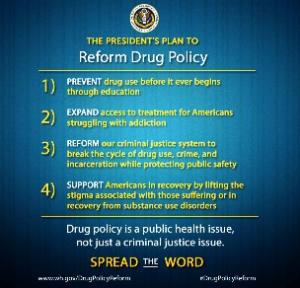This year's National Drug Control Strategy was released today. There are some steps in the right direction, but otherwise, it pretty much looks like every annual drug strategy for the past 20 years.
An initiative that would legalize the possession and cultivation of small amounts of marijuana appears poised to qualify for the ballot after organizers handed in more than twice the needed number of signatures.
New York becomes the 23rd medical marijuana state, North Carolina becomes a high-CBD cannabis oil state, Utah issues the first permits for high-CBD cannabis oil, Californians prepare to lobby for a statewide regulation bill, and more.
A Tampa man was shot and killed by a police SWAT team over marijuana sales totaling less than $200. In an unusual twist, the local newspaper actually did an in-depth investigation of the incident, and the results aren't pretty.
A Denver SWAT team member shot and killed the target of an undercover drug investigation when he pulled a weapon as uniformed cops moved in for an arrest.
We present a trio of law enforcement miscreants, including a Houston deputy who was ripping off dealers and selling their wares, a North Carolina cop with a pill problem, and a Baltimore schools cop who was flipping rocks on the side.
The Afghan poppy trade is spilling over into Central Asia, legal marijuana goes on sale in Washington state on Tuesday, Georgia holds off on welfare drug testing, a California sentencing reform bill is now one vote away from passage, and more.
This fall's drug policy initiative picture is beginning to clear up, with DC and Oregon seemingly on the way to voting on marijuana legalization in November, the first retailer sales licenses for marijuana in Washington state were issued today, with the signature of Gov. Cuomo, New York becomes the 23rd medical marijuana state, and more.
There are now two states where marijuana can be legally sold to adults, Marc Emery's time in America's drug war gulag comes to an end, two senators file the REDEEM Act for ex-offenders, there may be magic in those mushrooms, and more.
The White House issues its annual drug control strategy, the Brooklyn DA announces an end to most small-time marijuana possession arrests, a suburban Maryland county adopts a marijuana reform resolution, the first medical cannabis oil permits are issued in Utah, Lebanese hash farmers vow to fight to protect their crops, and more.
The White House Office of National Drug Control Policy (ONDCP -- the drug czar's office) released its 2014 National Drug Control Strategy Wednesday. While in general, it is remarkable for its similarities to drug control strategies going back more than a decade, it does include some signals suggesting that the Obama administration is ready for a shift in emphasis in the drug war -- from a criminal justice approach to a more public health-oriented approach.
But even that rhetorical positioning is somewhat undercut by the strategy's continuing commitment to the
criminalization of drug users and the people who supply them, as well as particular policy prescriptions, such as its support for expansion of drug courts -- the use of the criminal justice system to enforce therapeutic health goals like abstinence from drug use, as opposed to measures that don't involve criminal justice intervention.
The 2014 strategy also continues the roughly 3:2 funding ratio between law enforcement and treatment and prevention spending that has marked federal anti-drug spending since at least the Clinton administration in the 1990s. And it does so somewhat deceptively.
"In support of this Strategy," ONDCP wrote in a press release, "the President has requested $25.5 billion in Fiscal Year 2015. Federal funding for public health programs that address substance use has increased every year, and the portion of the Nation's drug budget spent on drug treatment and prevention efforts -- 43% -- has grown to its highest level in over 12 years. The $10.9 billion request for treatment and prevention is now nearly 20% higher than the $9.2 billion requested for Federally-funded domestic drug law enforcement and incarceration."
What the press release doesn't mention when claiming that treatment and prevention spending now exceeds spending on law enforcement is that it did not include figures for drug interdiction and international spending on the law enforcement side of the ledger. The White House's proposed federal drug budget for 2015, however, shows that those drug prohibition-enforcement costs add up to another $5.4 billion, or $14.6 billion for enforcing drug prohibition versus $10.9 billion for treatment and prevention.
The strategy does, however, provide a sharper focus than in the past on reducing the harms associated with drug use, such as overdoses and the spread of HIV/AIDS, hepatitis C, and other blood-borne diseases. It calls for greater access to the opiate overdose reversal drug naloxone and supports needle exchange and state laws that provide limited immunity from prosecution for people suffering overdoses and the people who seek help for them -- the so-called 911 Good Samaritan laws. The strategy also sets a five-year goal for reducing overdose deaths, something drug reform advocates had been seeking.
The strategy also acknowledges the need to reduce mandatory minimum drug sentencing and recognizes that the US has the world's largest prison population, but in absolute terms and per capita. And, implicitly acknowledging that Americans increasingly see the war on drugs as a failed policy, the 2014 strategy has adjusted its rhetoric to emphasize public health over the drug war.

Acting ONDCP head or "drug czar" Michael Botticelli (ONDCP)
But, despite polls now consistently showing majority support for marijuana legalization, and despite the reality of legal marijuana in two states, with two more and the District of Columbia likely to embrace it later this year, the 2014 strategy appears not only wedded to marijuana prohibition, but even disturbed that Americans now think pot is safer than booze.
That puts ONDCP at odds not only with the American public, but with the president. In an interview published in January by the New Yorker, Obama said marijuana is less dangerous than alcohol "in terms of its impact on the individual consumer."
Noting that about three-quarters of a million people are arrested on marijuana charges each year, and nearly nine out of ten of those for simple possession, the Marijuana Policy Project (MPP) pronounced itself unimpressed with the new national drug strategy.
The drug czar's office is still tone deaf when it comes to marijuana policy. It appears to be addicted to marijuana prohibition. Why stay the course when the current policy has utterly failed to accomplish its goals?" asked MPP communications director Mason Tvert.
"The strategy even goes so far as to lament the public's growing recognition that marijuana is not as harmful as we were once led to believe. President Obama finally acknowledged the fact that marijuana is less harmful than alcohol, yet his administration is going to maintain a policy of punishing adults who make the safer choice," Tvert continued. "Most Americans think marijuana should be made legal, and even the Justice Department has acknowledged that regulating marijuana could be a better approach than prohibition. Legalizing and regulating marijuana is not a panacea, but it is sound policy."
The Drug Policy Alliance (DPA), with a wider policy remit than MPP, had a nuanced response to the release of the drug strategy. It was critical of some aspects of the strategy, but had kind words for others.
"The administration says drug use is a health issue but then advocates for policies that put people in the criminal justice system," said Bill Piper, DPA national affairs director. "Until the drug czar says it is time to stop arresting people for drug use, he is not treating drug use as a health issue no matter what he says. I know of no other health issue in which people are thrown in jail if they don't get better."
Still, said Piper, the drug czar's office deserves some credit for addressing serious issues associated with drug use under prohibition.
"Director Botticelli should be applauded for taking strong steps to reduce drug overdose fatalities and the spread of HIV/AIDS, hepatitis C and other infectious diseases," he said. "His leadership on these issues, and his work overall to reduce the stigma associated with substance misuse, are encouraging."
But when it comes to marijuana policy, DPA found itself pretty much on the same page as MPP.
"The Administration continues to keep its head in the sand when it comes to marijuana law reform," said Piper. "Hundreds of thousands of Americans are being arrested each year for nothing more than possessing small amounts of marijuana for personal use. Once arrested they can be discriminated against in employment and housing for life. The administration can't ignore the destructive impact of mass arrests forever."
back to top
It now looks extremely likely that the residents of the nation's capitol will vote in November on whether to legalize the possession and cultivation of small amounts of marijuana. Representatives of the DC Cannabis Campaign legalization initiative handed in some 58,000 signatures Monday morning, and they only need some 25,000 valid voter signatures to qualify for the ballot.

outside DC election headquarters (drugpolicy.org)
Signature-gathering experts generally expect to see something between 20% and 30% of signatures handed in deemed invalid. For the DC initiative to fail to qualify, the invalidation rate would have to be above 50%.
The measure will be known as Initiative 71 once it officially qualifies for the ballot.
The District of Columbia isn't the only locale where marijuana legalization is almost definitely going to be on the ballot this fall. An Alaska legalization initiative has already qualified, and organizers of an Oregon legalization initiative just last week handed in more than 145,000 signatures, nearly twice the 88,000 valid voter signatures needed to qualify.
Colorado and Washington led the way on marijuana legalization, with voters in both states passing legalization initiatives in 2012. DC, Alaska, and Oregon all appear poised to join them in November.
In DC, campaigners will emphasize the racially disparate impact of marijuana prohibition. In 2010, black people accounted for 91% of marijuana arrests, even though they now account for less than half the city's population. The District is also currently saddled with the highest per capita marijuana arrest rates in the nation.
The DC initiative is not a full-blown legalize, tax, and regulate measure. It would allow people 21 and over to possess up to two ounces of marijuana and cultivate six plants at home. But District law prevents initiatives from addressing budgetary issues, which precludes the initiative addressing the tax and regulate/marijuana commerce aspect of legalization. But the DC city council currently is considering a tax and regulate bill to cover that.

boxes of signature petitions ready to go (drugpolicy.org)
The city council passed a decriminalization bill that goes into effect shortly, but advocates argued based on other decrim laws in the states that alone is not enough to change police practices. They noted that in Colorado and Washington, where actual legalization is in effect, marijuana arrest rates have dropped dramatically. Those declines not only save millions in tax dollars; they also save thousands of people from the legal and collateral consequences of a pot bust.
After handing in signatures this morning, key players in the initiative gathered for a noon tele-conference.
"In just a few weeks, DC's groundbreaking decriminalization law goes into effect," said Bill Piper, national affairs director for the Drug Policy Alliance, which is supporting the initiative. "But decriminalization is just the first step. Today, the DC Cannabis Campaign turned in enough signatures to put Initiative 71 on the ballot."
"Last week, the US celebrated the 50th anniversary of the signing of the Civil Rights Act," noted Dr. Malik Burnett, recently brought in as DC policy manager for the Drug Policy Alliance. "Drug policy reform is the civil rights issue of this century. Prohibition isn't working, and it is leading to poor outcomes, especially in communities of color. We definitely applaud the city council for getting decriminalization done, but in other jurisdictions with decriminalization, we continue to see a large number of racially biased arrests. If we look at jurisdictions that have legalized, arrest rates for small amounts of marijuana are down 75%."
"Today is a big day in this effort," said Councilmember David Grosso, sponsor of the Tax and Regulate Marijuana Act of 2014. "It looks like it will be on the ballot this fall, and I'm confident that people here in DC will vote to legalize marijuana. The people have been in the forefront of this for a long time, starting with medical marijuana back in 1998."
Grosso said he sponsored the tax and regulate bill because of the failures of prohibition.
"I'm a strong believer that the war on drugs has been a failure," he said. "We need to move beyond putting people in jail for marijuana and non-violent offenses. But once we legalize it, it's important to regulate it in a way that is responsible for the District, which is why I introduced the tax and regulate bill. It has to go through a couple of committees, but we're a full-time legislature and could have it done by the end of the year. If not, I will reintroduce it next year."
"This initiative is very different from the other efforts," said DC Cannabis Campaign chair and long-time DC political gadfly Adam Eidinger. "It's very focused on the consumer, how we can keep them out of jail and give them a supply without creating a marketplace. This is looking at the rights of the individual and letting them produce their own at home. This by itself isn't full legalization -- Grosso's bill is the complete picture, but we can't put that on the ballot, so we did the next best thing to enshrine the rights of the consumer," he explained.
"We already passed home cultivation for medical marijuana in 1998, and many us were demanding from the city council that we actually get home cultivation as part of medical," Eidinger noted. "Their failure to do so has fueled the interest in pushing this forward. Medical marijuana is not the destination for every user, nor is decriminalization. The goal is to stop the bleeding, to stop arresting four or five thousand people here every year. My goal is take marijuana arrests down to zero," he said.

DC election workers start validating signatures. (drugpolicy.org)
"I want to note that I am also the social action director for
Dr. Bronner's Magic Soaps, a major backer which provided money to get this off the ground," said Eidinger. "We've raised and spent at least $150,000 and we hope to raise another $100,000 between now and election day. A lot of these initiative campaigns are fueled by business interests, but we're not offering a retail outlet as the end result of the initiative. It's a little more difficult to raise money when it's about civil rights -- not making some business person rich."
Even if the initiative makes the ballot and passes, there is still an outside chance that congressional conservatives will seek to block it. That's what happened with the 1998 medical marijuana initiative, which Congress didn't allow to go into effect for more than a decade.
Similar moves are already afoot over the District's yet-to-go-into-effect decriminalization law. A Maryland congressmen and physician, Rep. Andy Harris (R), has already persuaded the House Appropriations Committee to approve a rider to the DC appropriations bill that would block implementation of the decrim law. But that measure still has to be approved by the House as a whole, and then by the Senate.
If that were to happen, it wouldn't be without a fight.
"The Drug Policy Alliance and the DC Cannabis Campaign look forward to working with members of the city council to expand on Initiative 71 to develop tax and regulate centered around the idea of racial justice," said Dr. Burnett. "The first step is passing 71 to show the will of the people, followed by legislation from the city council. That combination will show Congress that DC residents are serious about reforming their drug policies, and Congress will respect DC home rule."
Dr. Burnett also had some advice for Dr. Harris, the Republican congressman trying to block DC marijuana reforms.
"I would encourage Dr. Harris to take a continuing medical education class on cannabis and to see the reports from the Centers for Disease Control and the National Institutes on Drug Abuse that teen marijuana use is flat and to understand that the health outcomes associated with incarceration are much worse than those associated with cannabis use," he said.
According to recent polls, support for legalizing marijuana in the District is around 60%. If the initiative actually makes the ballot, it has a very good chance to win in November. And if it wins in November, congressional conservatives will have to explain why DC residents aren't good enough for direct democracy, or get out of the way. And the following spring could see a thousand flowers bloom in the nation's capital.
back to top
New York becomes the 23rd medical marijuana state, North Carolina becomes a high-CBD cannabis oil state, Utah issues the first permits for high-CBD cannabis oil, Californians prepare to lobby for a statewide regulation bill, and more. Let's get to it:
CaliforniaLast Friday, the San Diego sheriff's office returned marijuana to a raided dispensary. Sheriff's office officials have handed back 20 pounds of marijuana, as well as grow equipment, seized in a raid last year from the SoCal Pure Collective in North County. The legal case against the collective was dropped in April, and a judge ordered all the confiscated goods returned. But collective operator Laura Sharp still fumes over the raid itself, a paramilitarized exercise of police power aimed at patients and providers. "I don't think that we needed to have assault rifles held to our heads. I think we could have been served paperwork," she said.
On Wednesday, ASA set August 4 as this year's annual medical marijuana citizens lobby day in Sacramento. The medical marijuana advocacy group Americans for Safe Access has announced that its annual citizens' lobby day in Sacramento will be held this year on August 4. The group is supporting the statewide regulation bill, Senate Bill 1262, but wants some changes, too. Click on the title link for more details.
On Tuesday, the Santa Ana city council approved a ballot measure on legalizing and taxing dispensaries. The city-backed ballot measure would compete with another measure that would repeal the city's existing ban on dispensaries. The Medical Cannabis Restriction and Limitation Initiative, which already has qualified for the ballot, would set up a process for dispensaries to register with the city and in return pay a 2% tax. It also limits dispensaries to certain zones and calls for at least one collective or cooperative for every 15,000 residents. The city-backed measure would implement a 5% tax.
New York
On Monday, Gov. Andrew Cuomo signed the Compassionate Use Act. In an official signing ceremony Monday, Gov. Andrew Cuomo (D) signed into law the Compassionate Use Act. New York thus becomes the 23rd medical marijuana state, even though its law is among the most restrictive and includes a ban on smoking (but not vaping or eating) it.
North Carolina
Last Thursday, a limited, low-THC, high-CBD medical marijuana became law. Gov. Pat McCrory (R) has signed into law a bill that will allow people suffering from certain epilepsy conditions to use cannabis extracts containing less than 0.3% THC and more than 10% CBD. But only neurologists in a pilot study may recommend it.
Utah
On Tuesday, Utah officials issued the first permits to use high-CBD, low-THC cannabis oil. Utah officials Tuesday issued the first permits to use high CBD cannabis oil for the treatment of epilepsy in children under a law passed earlier this year. That law okays the use of cannabis oils containing at least 15% CBD and less than 0.3% THC. But while initial permits have been issued, families are likely to have to wait until September to acquire the cannabis oil because the Colorado non-profit that produces it has a long waiting list and a crop that won't be ready until the fall.
[For extensive information about the medical marijuana debate, presented in a neutral format, visit MedicalMarijuana.ProCon.org.]
back to top
A Tampa, Florida, man was shot and killed by members of a SWAT team executing a search warrant over small-time marijuana sales on May 27. Jason Westcott, 29, becomes the 25th person to die in US domestic drug law enforcement operations so far this year.
[Editor's Note: This case illustrates why we call on readers to let us know if they come across a report of a drug war-related death. Although we run Google searches to find such incidents, this one didn't pop up on the radar until the Tampa Bay Times
ran a thorough investigative piece -- a rarity with such incidents -- on it this week. Absent that report, we would have missed it. So, please, feel free to send your tips and links our way.]According to the Tampa Bay Times article, a Tampa Police SWAT team executing a warrant for marijuana sales knocked on the door of the home shared by Westcott and his roommate on the evening of the 27th, but both men were sleeping. When no one answered, police entered through the unlocked front door.
The roommate, who was sleeping on a couch, was taken into custody without incident, but Westcott, who had been sleeping in a bedroom, picked up a weapon upon hearing the intruders and moved toward the bathroom, from where he could see his surveillance monitor. Upon encountering Westcott in the hallway between the bedroom and the bathroom, two SWAT officers opened fire, shooting him five times with a semiautomatic shotgun and a handgun.
Police claim Westcott pointed his weapon at them. He never fired it. Instead, hit once in the arm and twice in the side, he collapsed on the bathroom floor. He received medical attention from a SWAT medic on scene, then was transported to a local hospital, where he died.
Ironically, the only previous contact Westcott had had with Tampa police was several months earlier, when he contacted them to say he was worried that a man who had been at his house planned to rob him and had threatened to kill him. According to people close to Westcott, investigating officers told him: "If anyone breaks into this house, grab your gun and shoot to kill." Tampa police now deny they ever said anything like that.
The Times investigative piece also looked into the police drug investigation that precipitated the fatal raid. They found that despite police statements that they began looking at Westcott because of complaints from neighbors, the investigation actually began when a snitch reported that he was selling marijuana.
Over a period of months, that same snitch made several small marijuana purchases from Westcott, in amounts ranging from $20 to $60. The grand total of marijuana purchased by the snitch was less than $200. When the raid actually went down, police found a grand total of 0.2 grams of weed.
Westcott's roommate said the pair were habitual pot smokers, but that they never kept more than 12 grams in the house at a time to avoid felony charges. And he said that the pair engaged in a bit of social dealing, nothing more.
"We would just sell a blunt here and there to our friends or whatever. It was no crazy thing," he said. "There weren't people coming in and out of our house every day," he said. "It wasn't paying any bills. We were still broke... going to work every day."
Police initially said an undercover officer had made the drug buys, but later admitted it was the snitch who had done so. The roommate said if police had made the buys themselves, they would have realized that they were not facing violent drug traffickers, and Westcott might still be alive.
"Nobody can believe that this happened to Jason. They can't understand how this could happen to Jason," said Westcott's mother, Patti Silliman of New Port Richey. "No one can figure this out."
But the Hillsborough State Attorney's Office has already determined that the two police officers who shot at Westcott -- Cpl. Eric Wasierski and Officer Edwin Perez -- were justified in the use of deadly force. And Tampa Police Chief Jane Castor defended both the drug investigation and actions of the officers involved.
"Mr. Westcott lost his life because he aimed a loaded firearm at police officers. You can take the entire marijuana issue out of the picture," Castor said. "If there's an indication that there is armed trafficking going on -- someone selling narcotics while they are armed or have the ability to use a firearm -- then the tactical response team will do the initial entry."
The Tampa Bay Times investigative report is worth reading in its entirety. One could only wish that every drug war death got the same treatment. If that were the case, we might end up with a lot less of them.
back to top
A Denver man was shot and killed during an undercover drug investigation last Wednesday afternoon. Joseph Valverde, 32, becomes the 24th person to die in US domestic drug law enforcement operations so far this year.
According to the
Denver Post, citing Denver Police Chief Robert White,
Valverde was shot and killed in the parking lot of Overland Pond Park. White said that when uniformed Denver police officers arrived to arrest
Valverde, he pulled a gun. An officer then opened fire, striking
Valverde.
White said Valverde threatened officers, but did not fire his weapon. He was pronounced dead later at a local hospital.
Denver 9 News, which first named the victim, reported that Valverde was shot by a SWAT team member, that police sources said the bust involved "a significant amount of cocaine" and that "law enforcement believed the suspect was very violent and dangerous."
In a separate story, Denver 9 News reported that Valverde had prior convictions for drug possession, assault, weapons charges, and criminal mischief.
back to top
We present a trio of law enforcement miscreants, including a Houston deputy who was ripping off dealers and selling their wares, a North Carolina cop with a pill problem, and a Baltimore schools cop who was flipping rocks on the side. Let's get to it:
In Houston,
a Harris County sheriff's deputy was arrested Monday just after selling cocaine, marijuana,
Loricet, and Soma to an undercover officer. Deputy Christopher Ellis, 34, is charged with two counts of felony possession of a controlled substance with the intent to deliver. He went down after investigators received information that he was stealing drugs from dealers while on duty, then reselling them for a profit. At last report, he was in the Harris County Jail trying to raise $120,000 bail.
In New Bern, North Carolina, a former New Bern police officer pleaded guilty Monday to stealing drug evidence from defendants and from the department evidence room. Frances Sutton admitted taking drugs on at least four occasions. Officials say it was for her personal use. It's not clear what formal charge she pleaded to, but she will serve between one and two years in prison. Because of her tampering with evidence, nine cases involving six drug defendants had to be dismissed.
In Baltimore, a Baltimore city schools police officer pleaded guilty Tuesday to dabbling in crack cocaine trafficking. Napoleon McLain Jr., 31, admitted buying several ounces of coke between December 2012 and August 2013 and selling the drug to at least four other people, including, unfortunately for him, a snitch. He copped to one count of conspiring to distribute and possess cocaine base. He's looking at up to 40 years in prison when sentenced in October.
back to top
The Afghan poppy trade is spilling over into Central Asia, legal marijuana goes on sale in Washington state on Tuesday, Georgia holds off on welfare drug testing, a California sentencing reform bill is now one vote away from passage, and more. Let's get to it:

Central Asian countries are getting in on the Afghan drug trade, according to a new report. (unodc.org)
Retail Marijuana Sales Begin at Noon Tuesday in Seattle. The first legal retail marijuana sale in Seattle will take place at noon Tuesday, the owner of Cannabis City says. But the first pot sold legally in Washington state may actually be purchased in Bellingham, where Top Shelf Cannabis says it will be open at 8:00am.
DC Mayor Calls for 4th of July Boycott of Maryland Shore to Protest Congressman's Move to Mess With City's Decriminalization Law. DC Mayor Vincent Gray (D) is joining DC activists in calling for city residents to not spend their holiday weekends in Ocean City or St. Michaels, Maryland. That's the area represented in Congress by Rep. Andy Harris (R-MD), who authored a successful amendment to a House budget bill that would effectively overturn the District's decriminalization law. DC residents who want to enjoy the beach should instead go to Rehoboth Beach, DE, or Chincoteague Island, VA, instead, Gray suggested.
Medical Marijuana
North Carolina Governor Signs Limited Low-THC, High-CBD Medical Marijuana Law. Gov. Pat McCrory (R) has signed into law a bill that will allow people suffering from certain epilepsy conditions to use cannabis extracts containing less than 0.3% THC and more than 10% CBD. But only neurologists in a pilot study may recommend it.
Drug Testing
Georgia Governor Holds Off Welfare Drug Testing. Gov. Nathan Deal (R) has announced that even though a new law to drug test welfare recipients went into effect Tuesday, he will delay implementing it until a federal appeals court rules on a similar Florida law. But the Florida law mandates suspicionless mandatory drug testing, while Georgia's law, House Bill 772, only requires drug testing upon suspicion of drug use, so some critics are wondering if something else is at play. The Georgia law also had a food stamp applicant drug testing provision, but that part has already been nullified by the US Department of Agriculture, which runs the food stamp program.
Sentencing
California Fair Sentencing Act Wins Final Assembly Committee Vote. The California Fair Sentencing Act (Senate Bill 1010) was approved by the Assembly Appropriations Committee on a 12-3 vote Wednesday and now heads for an Assembly floor vote. Sponsored by Sen. Holly Mitchell (D-Los Angeles), the bill would correct the sentencing and other disparities between crack and powder cocaine. The bill has already been approved by the Senate.
Law Enforcement
US Indicts Three Peruvian Shining Path Leaders on Drug, Terrorism Charges. Three leaders of the Peruvian Shining Path guerrilla group have been indicted in New York on drugs, weapons, and terrorism charges. They are accused of cocaine trafficking and committing terrorist acts against Peruvian -- not American -- civilians and military personnel. They are Florindo Flores Hala, also known as Comrade Artemio, and Victor and Jorge Quispe Palomino. Flores Hala is in custody, but the Quispe Palomino brothers are not. Among other things, they are charged with providing material support to a terrorist organization, i.e. themselves.
ACLU Sues Massachusetts SWAT Teams for Refusing to Release Public Records. The ACLU of Massachusetts has filed a lawsuit against SWAT teams in the state after they refused to release records sought in a freedom of information request. The SWAT teams are making the novel legal argument that they are not required to comply because the law enforcement councils that operate them are not public entities, but private, not-for-profit groups. Click on the link for a lengthy article on the issue.
International
Afghanistan's Central Asian Neighbors Complicit in Drug Trade, Report Says. About the only substantive cooperation between Afghanistan and its Central Asian neighbors comes in turning a blind eye to the opium and heroin trade, according to a new report from Afghanistan Analysts. The report is Between Cooperation and Insulation: Afghanistan'sa Relations With the Central Asian Republics.
back to top
This fall's drug policy initiative picture is beginning to clear up, with DC and Oregon seemingly on the way to voting on marijuana legalization in November, the first retailer sales licenses for marijuana in Washington state were issued today, with the signature of Gov. Cuomo, New York becomes the 23rd medical marijuana state, and more. Let's get to it:

Handing in signatures to DC election officials this morning. (DrugPolicy.org)
DC Legalization Initiative Backers Turn in More Than Twice the Signatures Needed. Supporters of the DC Cannabis Campaign initiative to legalize the possession and cultivation of small amounts of marijuana turned in more than 58,000 signatures this morning. They only need 25,000 valid voter signatures to qualify for the November ballot. The initiative does not seek to tax and regulate marijuana commerce because DC law precludes that, leaving it up to elected officials. A tax and regulate bill is before the DC city council.
Oregon Legalization Initiative Backers Turn in Close to Twice the Signatures Needed. The New Approach Oregon legalization initiative campaign turned in 145,000 signatures Thursday to put their measure on the November ballot. They only need 87,000 valid voter signatures to qualify, so this is looking very much, but not quite, like a done deal. Stay tuned.
Arkansas Marijuana Initiatives Come Up Short. Neither marijuana legalization nor medical marijuana will be on the ballot this fall. Campaigners for two separate marijuana reform initiatives came up short on signatures for both. Arkansans for Compassionate Care, the folks behind the medical marijuana initiative, say they will be back in 2016.
Washington State Liquor Control Board Issues First Marijuana Retailer Licenses. The first marijuana retail licenses were issued today, with the first retailers expected to be open for business tomorrow as Washington joins Colorado among the legal marijuana commerce states. Click on the link above for a list of the 24 approved licensees.
Massachusetts Poll Has Voters Evenly Split on Support for Legalization. A new Boston Globe poll has support for legalizing marijuana at 48%, with 47% opposed, and 5% undecided. Click on the poll link for more demographic info and top lines.
Denver Cops Raid Marijuana Social Club. Denver Police last week raided Maryjane's Social Club, a private pot-smoking club operating in a grey area under state law. Police handcuffed smokers and charged them with smoking in public, seized drug paraphernalia, and ticketed the club owner for violating the state's no-smoking-inside laws. Club owners argue that since neither marijuana nor food and beverages are sold at the clubs -- patrons bring their own -- they should be permissible.
Medical Marijuana
Governor Signs Compassionate Use Act, Making New York 23rd Medical Marijuana State. In an official signing ceremony today, Gov. Andrew Cuomo (D) signed into law the Compassionate Use Act. New York thus becomes the 23rd medical marijuana state, even though its law is among the most restrictive and includes a ban on smoking (but not vaping or eating) it.
New Synthetic Drugs
Louisiana Bans Two More New Synthetics. The state Department of Health and Hospitals has banned two synthetic drugs, FUB-AMB AMB (methyl (1-(4-fluorobenzyl)-1 H-indazole-3-carbonyl) valinate) and 5-flouro-AMB ((S)- methyl 2- (1- (5- fluoropentyl)- 1H- indazole- 3- carboxamido)- 3- methylbutanoate). The two drugs are marketed as fake marijuana under the names Train Wreck 2 and Kali Berry 2. The ban came last Thursday via an emergency rule.
Drug Testing
Tennessee Welfare Drug Test Law Goes into Effect. As of July 1, people applying for welfare will have to answer three questions on a form about potential drug use. Those who answer any of the questions positively will have to submit to drug testing. Positive test results will result in a postponement of benefits until the applicant has completed a treatment or recovery program and been re-tested. The ACLU of Tennessee says it is considering a legal challenge to the law.
Harm Reduction
Missouri Governor Signs Bill Allowing First Responders to Carry Opiate Overdose Reversal Drug. Gov. Jay Nixon (R) last Thursday signed into law House Bill 2040, which will allow first responders to carry and administer the opiate overdose reversal drug naloxone. The new law goes into effect August 28.
North Carolina Drug Users Have Prevented 100 Fatal Overdoses with Naloxone. Last week, the North Carolina Harm Reduction Coalition reported that the opiate overdose reversal drug naloxone distributed to drug users, their friends, and families has prevented its 100th fatal drug overdose. The distribution is the result of the passage of 911 Good Samaritan/Naloxone Access law in April 2013.
Law Enforcement
Maryland Cops No Longer Have to Report Racial Profiling, SWAT Statistics. Laws requiring state law enforcement agencies to collect and report racial data on traffic stops and to provide the state with information about SWAT deployments have expired. The legislature failed to act to renew them, but some legislators are vowing to make it their first order of business next session. Both laws were passed because of perceived abuses by law enforcement.
International
Colombia's First Needle Exchange Programs are Open. Needle exchange programs in five Colombian cities got underway last week, with health professionals handing out clean syringes to drug users in Armenia, Bogota, Cali, Cucuta, and Medellin. The Health Ministry has allocated 100,000 clean syringes for the program, which will also collect and destroy dirty needles.
Austrian Justice Minister Says No to Marijuana Legalization. Responding to a proposal from the Tyrolean Social Democratic Party (SPO) to legalize marijuana, Austrian Justice Minister Wolgang Brandstetter just says no. "Legalization is not an issue, even in the summer," Brandstetter said. "It's all about prevention, too, in my view, we must reduce the consumption of addictive substances - including soft drugs such as cannabis," he added. Recent polls show only about one-third of Austrians favor legalization.
Caricom Commission to Study Marijuana Reform. The Community of Caribbean Nations (Caricom) last week created a commission to study how the region should respond to demands for medical marijuana, decriminalization, and other marijuana reforms. The commission will report before Caricom's next summit, set for February 2016. An earlier Caricom report found that allowing medical marijuana could boost the regional economy.
Ireland to Allow Medical Marijuana. The CEO of Ireland's Health Products Regulatory Authority (HPRA) said today the Department of Health was drafting legislation to allow medical marijuana to be made available to patients. Pat O'Mahony said that medical marijuana would be available by prescription and sold at pharmacies.
back to top
There are now two states where marijuana can be legally sold to adults, Marc Emery's time in America's drug war gulag comes to an end, two senators file the REDEEM Act for ex-offenders, there may be magic in those mushrooms, and more. Let's get to it:

Marc Emery is about to leave the land of the living dead and rejoin his wife, Jodi, back home in Canada. (wikimedia.org)
Washington State Retail Marijuana Sales Began This Morning. The first legal recreational marijuana sales in Washington occurred shortly after 8:00am today, when a visitor from Kansas bought two grams of pot for $26.50 at Top Shelf Cannabis in Bellingham. The state has authorized up to 344 retail marijuana outlets, but only a handful are open today, and there are worries about legal marijuana shortages as well. Stay tuned as Washington treads down the path of pot legalization.
Canadian "Prince of Pot" Marc Emery Gets Out of US Prison Tomorrow. The five-year legal martyrdom of Canadian marijuana legalization gadfly Marc Emery is about to come to an end. Emery will leave federal prison tomorrow after serving a sentence for selling marijuana seeds to customers in the US. He won't get back home to Canada immediately; there is some red tape involved that will keep him in the US for several more weeks, but we fully expect Emery to take up where he left off in terms of relentless activism -- once he has had a chance to reunite with his stalwart wife, Jodi.
New York Fairness and Equity Act Seeks to End Marijuana Arrests, Fix Loopholes in State Law. Elected officials, community groups, and activists will rally Wednesday at New York City Hall to announce the introduction of the Fairness and Equity Act. The bill is designed to end mass, racially-biased marijuana possession arrests by fixing the state's decriminalization law to eliminate the difference between private and public possession, creating a process for those arrested under the current law to clear their records, and reducing the harms of collateral consequences of pot possession arrests. The bill is not yet available on the state legislative web site. Click on the link for more details.
Medical Marijuana
San Jose Collectives, Dispensaries Fight Looming Shut-Downs With Referendum Effort, Thursday Protest. The city of San Jose has recently passed an ordinance that will result in the forced closure of more than 70 collectives and dispensaries, and the industry is fighting back. There is a petition drive underway to stop the city from shuttering the businesses, and there will be a rally throughout Thursday afternoon at city hall. Stay tuned.
San Diego Sheriff's Office Returns Marijuana to Raided Dispensary. Sheriff's office officials have handed back 20 pounds of marijuana, as well as grow equipment, seized in a raid last year from the SoCal Pure Collective in North County. The legal case against the collective was dropped in April, and a judge ordered all the confiscated goods returned. But collective operator Laura Sharp still fumes over the raid itself, a paramilitarized exercise of police power aimed at patients and providers. "I don't think that we needed to have assault rifles held to our heads. I think we could have been served paperwork," she said.
Psychedelics
Study Finds Magic Mushrooms Open Strange Brain State, Could Unlock Permanent Shifts in Perspective. A study published in the journal Human Brain Mapping has found that psychedelic mushroom compounds may be opening brain states usually experienced only in dreams and suggests that their use may have permanent positive effects on the brain. This could open the door for more research on the use of psychedelics as a treatment for disorders such as depression and anxiety. Click the study link for more details.
Reentry and Rehabilitation
Senate Odd Couple Introduce REDEEM Act to Assist Ex-Cons with Re-Entry. New Jersey Democratic Sen. Cory Booker and Kentucky Republican Sen. Rand Paul will today introduce the REDEEM Act, which aims to assist formerly incarcerated people with reentering society in a productive manner. The bill would, among other things, help seal conviction records and eliminate barriers to reentry, employment, and public assistance. The bill is not yet up on the congressional web site.
International
Applicants Sought for Two-Week London Fellowship on West Africa Drug Policy Reform. The Open Society Foundation is seeking applicants for a West African fellowship on drug policy reform. The two-week program is set to take place in London in October, 2014, and will be hosted by the drug policy organization, Release. Those interested in the program are encouraged to apply by visiting the link here for more details. You have until July 31 to apply.
Conference on Marijuana Regulation in London Later This Month. A Cannabis Conference will be held July 23 at the House of Lords in London. It is supported and sponsored by Baroness Meacher, the chair of the All Party Parliamentary Group on Drug Reform Policy. Click on the link for more details.
Dominican Prime Minister Wants Review of Marijuana Laws. Dominican Prime Minister Roosevelt Skerrit told a press conference Tuesday that the time has come to review the country's marijuana laws. "We believe the time has come for us to look at the laws relating to marijuana, for example someone with a very small quantity of marijuana, we will send him to prison, and the question is, if a man has five grams of marijuana should this person be sent to prison for that small amount and that person would have a criminal record for the rest of his life," Skerrit said. His remarks come as CARICOM convenes a commission to study marijuana law reform in the region.
back to top
The White House issues its annual drug control strategy, the Brooklyn DA announces an end to most small-time marijuana possession arrests, a suburban Maryland county adopts a marijuana reform resolution, the first medical cannabis oil permits are issued in Utah, Lebanese hash farmers vow to fight to protect their crops, and more. Let's get to it:

Under Maryland's new decrim law, that bud won't get you arrested, but the pipe will. (wikimedia.org/erik fenderson)
Obama Offered a Hit of Weed in Denver; Responds With a Smile. During a visit to a Denver bar last night, President Obama was offered some of the state's legal marijuana. "Do you want to hit this?" came a voice from the crowd. The president did not respond to the offer, except to flash his trademark smile. On route to the event, the president was also confronted by apparently pro-marijuana protestors, including one holding a sign saying "Free Weed for Obama." We won't even mention the guy in a horse head mask who shook the president's hand.
Brooklyn DA Announces No More Prosecutions for First-Time Marijuana Offenders, Except… Brooklyn, New York, District Attorney Kenneth Thompson announced Tuesday that his office will no longer prosecute first-time offenders for small-time marijuana possession charges. "This new policy is a reasonable response to the thousands of low-level marijuana arrests that weigh down the criminal justice system, require significant resources that could be redirected to more serious crimes and take an unnecessary toll on offenders. Pursuant to this policy, we will use our prosecutorial discretion to decline to prosecute, and dismiss upfront, certain low-level marijuana possession cases based on criteria concerning the particular individual and the circumstances of the case. For example, cases will be dismissed prior to arraignment for those with little or no criminal record, but we will continue to prosecute marijuana cases which most clearly raise public health and safety concerns." But Thompson added that he would still pursue charges for public pot smoking, if the defendant is a teen (he will be directed to juvenile court and a diversion program), or if the defendant has a criminal record suggesting he may act violently under the influence of marijuana.
Montgomery County, Maryland, Adopts Marijuana Policy Reform Resolution. The Montgomery County council Tuesday unanimously adopted a resolution calling for making marijuana possession offenses the lowest law enforcement priority and for revising the state's yet-to-go-into-effect decriminalization law to include pot-smoking paraphernalia. Under the law as written, people could not be arrested for possessing small amounts of marijuana, but they can still be arresting for possessing the pipe to smoke it in.
Medical Marijuana
Utah Issues First Permits to Use High CBD, Low THC Cannabis Oil. Utah officials Tuesday issued the first permits to use high CBD cannabis oil for the treatment of epilepsy in children under a law passed earlier this year. That law okays the use of cannabis oils containing at least 15% CBD and less than 0.3% THC. But while initial permits have been issued, families are likely to have to wait until September to acquire the cannabis oil because the Colorado nonprofit that produces it has a long waiting list and a crop that won't be ready until the fall.
California Medical Marijuana Citizens' Lobby Day Will Be August 4. The medical marijuana advocacy group Americans for Safe Access has announced that its annual citizens' lobby day in Sacramento will be held this year on August 4. The group is supporting the statewide regulation bill, Senate Bill 1262, but wants some changes, too. Click on the title link for more details.
Drug Policy
White House Releases 2014 National Drug Control Strategy. The White House's Office of National Drug Control Policy (ONDCP -- the drug czar's office) today released its annual drug control strategy. In the big picture it doesn't appear to be a whole lot different from last year's, or the year before that or the year before that or… But there are some good things to be found. Check back here later today for a feature article on it. In the meantime, click on the link to take a look yourself.
International
Mexico Anti-Cartel Vigilantism Spreads Close to US Border. Vigilante groups targeting criminal drug trafficking organizations first sprung up last year in the west-central Mexican state of Michoacan, where they battled the Knights Templar cartel before eventually being folded into the Mexican police apparatus. Now, they are appearing in Tamaulipas state, just across the Rio Grande River from Texas. A group known as the Pedro Mendez Column is operating in the city of Hidalgo, where it does nightly patrols to defend the city from the Zetas cartel. It also claims to have killed several Zetas. And the Zetas claim to have killed several people it accuses of being linked to the vigilantes. The Zetas also accuse the rival Gulf cartel of arming the vigilantes.
Lebanese Marijuana Farmers Vow to Fight Back Against Eradication Campaign. The Lebanese government has announced it will begin destroying marijuana farms in the Bekaa Valley tomorrow, but farmers there are vowing to defend their crops with their lives. Ali Nasri Shammas, a major grower and spokesman for the illicit industry, said growers would do what it takes to defend their crops, whether by protesting, blocking roads, or more violent means. "We will also use arms to face the security forces, who will damage the crops, even if it leads to bloodshed. Destroying the crops is forbidden no matter the results," Shammas warned. Given the ongoing Syrian civil war next door, it remains to be seen whether the government will be able to actually eradicate much of the marijuana crop.
Russians Say They Lose 100,000 People a Year to Drug Overdoses. Russia's Federal Drug Control Service reports that nearly 100,000 people died of drug overdoses last year and that the rate of drug-related deaths in Russian urban areas was 28.7 per 100,000. That rate is 2.7 times higher than the previous year. By contrast, in the US, some 41,000 people died of drug overdoses in 2012, according to the Centers for Disease Control and Prevention.
back to top











